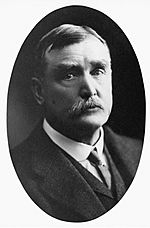Henry Lefroy facts for kids
Quick facts for kids
Sir Henry Lefroy
|
|
|---|---|
 |
|
| 11th Premier of Western Australia | |
| In office 28 June 1917 – 17 April 1919 |
|
| Monarch | George V |
| Governor | Sir William Ellison-Macartney |
| Preceded by | Frank Wilson |
| Succeeded by | Hal Colebatch |
| Member of the Legislative Assembly of Western Australia |
|
| In office 2 August 1892 – 24 April 1901 |
|
| Preceded by | George Randell |
| Succeeded by | Michael O'Connor |
| Constituency | Moore |
| In office 3 October 1911 – 12 March 1921 |
|
| Preceded by | None (seat recreated) |
| Succeeded by | James Denton |
| Constituency | Moore |
| Personal details | |
| Born | 24 March 1854 Perth, Western Australia |
| Died | 19 March 1930 (aged 75) Walebing, Western Australia |
| Political party | Nationalist |
Sir Henry Bruce Lefroy KCMG (born March 24, 1854 – died March 19, 1930) was an important leader in Western Australia. He served as the eleventh Premier of Western Australia, which is like being the head of the government for the state. He also worked as a Minister in different government departments and was a member of the state's parliament.
Contents
Sir Henry Lefroy's Life and Career
Early Life and Education
Henry Lefroy was born in Perth, Western Australia, on March 24, 1854. His father, Anthony O'Grady Lefroy, was a very important person in the government. He was the Colonial Treasurer of Western Australia for more than 30 years.
Henry started his schooling in Perth. Later, he traveled to England to continue his studies. He attended schools in Exmouth, Elstree, and then Rugby from 1868 to 1872.
In 1893, Henry Lefroy came back to Western Australia. He took over the management of his father's farm in Walebing. He inherited the farm when his father passed away in 1897.
Community and Early Public Service
Henry Lefroy was very involved in his local community. He was a member of the Victoria Plains Road Board from 1872 until 1899. This board helped manage local roads and services. He was even its chairman, or leader, from 1876 to 1897.
In 1874, he became a Justice of the Peace. This role meant he could help with legal matters and keep peace in the community. He also served on the local Board of Education for a time.
Henry Lefroy married Rose Agnes Wittenoom in Perth on April 15, 1880. They had three sons and one daughter together.
Starting in State Politics
On August 2, 1892, Henry Lefroy was elected to the Western Australian Legislative Assembly. This is the main law-making body for Western Australia. He represented the Moore area.
In 1897, he became a Minister for Education in the government led by John Forrest. He held this job until April 1898. After that, he became the Minister for Mines. He decided not to run for election in 1901, so he left parliament and his minister roles.
Representing Western Australia in London
From July 1901 to 1904, Henry Lefroy served as the Agent-General for Western Australia in London, England. This role meant he represented Western Australia's interests in the United Kingdom. While he was in London, his first wife, Rose Agnes, passed away in 1902.
In 1903, he received an important honor, being appointed CMG. On November 23, 1904, he married Madeleine Emily Stewart Walford in London. They had two sons and one daughter.
Return to Local and State Politics
After returning to Western Australia, Henry Lefroy tried to get elected to another part of parliament, the Western Australian Legislative Council, but he was not successful.
He continued his work in local government. He was again a member of the Victoria Plains Road Board from 1906 to 1909. Then, he became the chairman of the Moora Roads Board from 1909 until 1917.
On October 3, 1911, after a break of over ten years, Henry Lefroy was once again elected to the Legislative Assembly for the Moore area. In 1915, he became the deputy leader of the Liberal Party.
Becoming Premier of Western Australia
In July 1916, Henry Lefroy was appointed Minister for Lands and Agriculture. This was part of the government led by Frank Wilson. Wilson's government faced challenges in keeping support from other politicians.
Around this time, a new political group called the Nationalist Party was formed in May 1917. The members of this new party voted to choose their leaders. Frank Wilson and some of his ministers left the meeting, but Henry Lefroy stayed. He was then chosen as the leader of the new party.
Because Henry Lefroy was chosen as the new leader, Frank Wilson had to resign as Premier. So, on June 28, 1917, Henry Lefroy became the Premier of Western Australia.
Challenges as Premier
Henry Lefroy's time as Premier was challenging. His team of ministers was chosen by all the members of parliament, which was unusual. This group had different ideas, and there were often disagreements and a lack of teamwork.
For example, sometimes important decisions were made without his full knowledge. His government faced a vote of no confidence in April 1919. He only just managed to stay in power because his own vote broke a tie. When this information became public, Henry Lefroy decided to resign as Premier and leader of the Nationalist Party on April 17, 1919. Hal Colebatch was then chosen to take his place.
Henry Lefroy continued to serve as the member for Moore in parliament. However, he was not re-elected in the general elections on March 12, 1921. He spent his final years at his farm in Walebing, where he passed away on March 19, 1930.
 | Sharif Bey |
 | Hale Woodruff |
 | Richmond Barthé |
 | Purvis Young |

